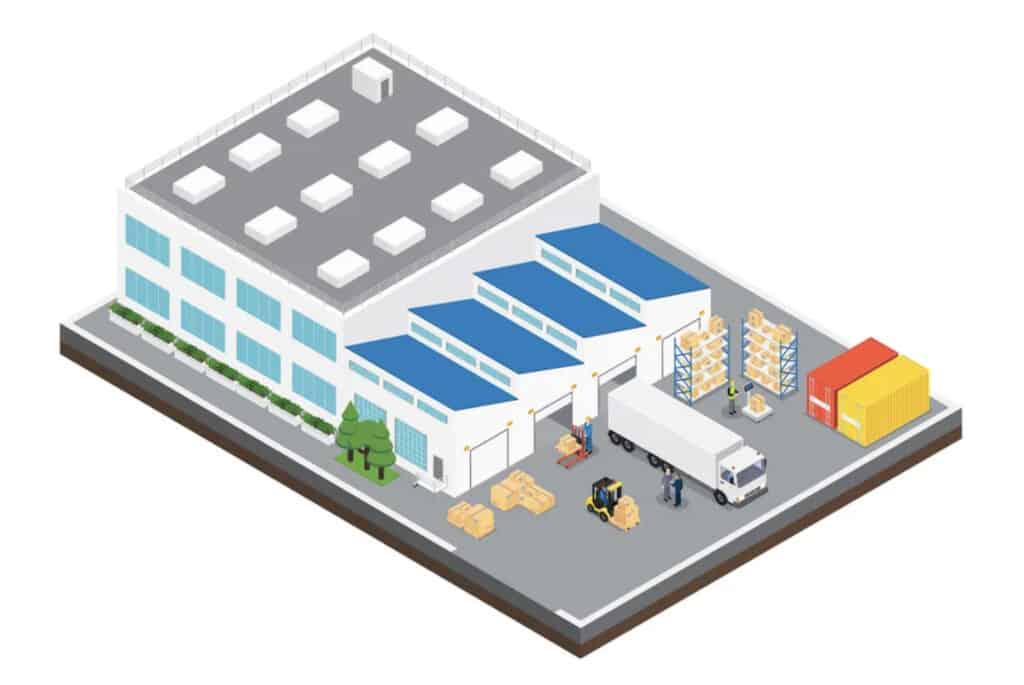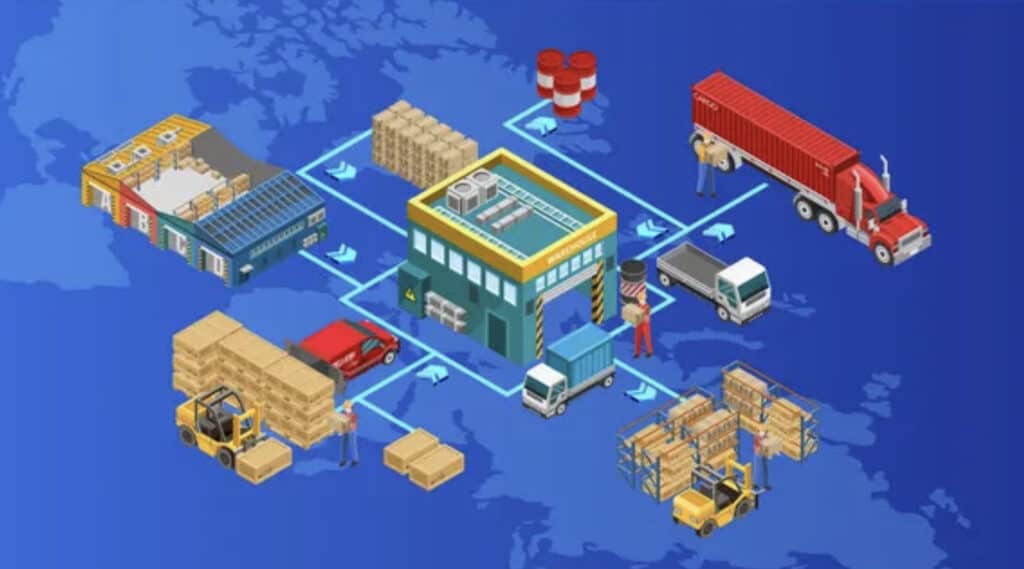Importers and exporters favor bonded warehouses, also known as bonds. Working with a bonded warehouse can simplify and streamline supply chain management and cash flow.
This article will explain what a bonded warehouse is and the benefits of working with one.
What exactly is a Bonded Warehouse?
A bonded warehouse is a location where shippers can store imported goods before they are processed by customs. Customs duties are not levied on goods stored in bonded warehouses. All applicable duties become payable once the goods have been delivered to their final destination.
There are two types of bonded warehouses: wet and dry. Alcohol and tobacco can be stored in wet bonded warehouses. Most other imported goods can be stored in dry bonded warehouses.

You can deliver your goods closer to their final destination if you use a bonded warehouse. It also implies that duty payments can be delayed until the product is moved.
This system has the potential to provide significant benefits to businesses that trade across borders. Using a bonded warehouse can eliminate the need to pay duties, resulting in inventory and cash flow efficiencies.
Examples of bonded goods you can typically find in a customs warehouse include:
- RMG Raw Materials
- Tobacco products
- Gourmet chocolates
- Perfume, skincare, and cosmetics
- Antiques
- Original artwork and paintings
- Coffee
- Specialty candy
- Handbags
- Watches
- Luxury clothing and accessories (sunglasses, jewelry, etc.)
- Electronics
- Other restricted goods
The Advantages of Bonded Warehouse in Bangladesh:
There are numerous benefits to using a bonded warehouse. Here are just a few of the advantages:
You can postpone or avoid paying duty and taxes.
VAT and other duty taxes can be deferred in a bonded warehouse until the goods are removed and shipped. This can give you breathing room and space to complete additional pre-sale tasks. Furthermore, if you export these goods, you can completely avoid these costs.
- Companies have reported tax savings of 25-30% as a result of using bonded warehouses.
- Long-term storage is possible.
- Most bonded warehouses will store your goods for up to five years or more. This can be useful if work is needed to meet import licensing requirements or if demand is lower than expected. You can store your goods in a bonded warehouse until you meet the requirements or demand increases.
- You can improve your customer service.
- You can order goods ahead of anticipated demand by utilizing bonded warehouses. Because goods are stored closer to the customer, you can deliver them faster and provide a better overall experience.
- Your product’s quality can be preserved.
- Bonded warehouses are equipped to store a wide range of products for as long as necessary while maintaining quality. Many bonded warehouses, for example, have dry containers, deep-freeze systems, temperature control facilities, and bulk storage facilities.
Bonded warehouses are capable of keeping your products safe and secure.
Proximity to ports:
The major government initiative taken by the Bangaldeshi government is the inception of bonded warehouse facilities in 1980. Under this policy, garment-related accessories can be imported free of duty as the garment industry is a 100% export-oriented industry.
After importing the inputs, the entrepreneurs keep the materials in a store of the factory and the customs officers inspect the materials. A condition of the bonded warehouse facility is that all imported materials must be used for the garment industry.
If any entrepreneurs sell these imported resources to the domestic market, they are subject to governmental penalties. Before this policy’s inception, there was a high duty on the import of garment-related materials. The cost of production was higher and the net profit was thereby lower.
But the implementation of this policy has favoured the garment industry and it can offer consumers its products at a lower price. Under the cash compensation scheme, domestic suppliers to export-oriented RMG factories used to receive a cash payment equivalent to 10% of the value addition of the exported RMG. Under the export-led development strategy,
the government of Bangladesh has undertaken other steps to compete in the world trade market.
Tariff Reform and bonded warehouse facilities by Govt:
Tariff reforms have become a high priority in the government’s policy reforms. Average tariff rates have been significantly reduced. The average tariff on all products was reduced from 114% in 1989 to 22% in 1999. The government has also ensured clarity, simplicity, and transparency in tariff administration.
Aside from regular security measures such as CCTV, goods in a bonded warehouse must be fully documented. You don’t have to worry about your cargo because security personnel monitor the space 24 hours a day.
Bonded warehouses are subject to detailed assessment and regular auditing, giving you peace of mind that you’re working with a reputable company. Your goods are kept closer to the ports.

The majority of bonded warehouses are situated near major ports. This enables businesses to store goods at the port of entry until they are ready for distribution. By reducing lead time, transportation costs, and potential damage, these bonded warehouses can save money across the entire supply chain.
Bonded Warehousing refers to the facility provided to export-oriented industries for duty-free importation of inputs/raw materials and packaging materials. In order to promote export-oriented industrialization and facilitate exports, the National Board of Revenue (NBR) offers Bonded Warehousing benefits to a variety of industries.
Utilizing the facility of a bonded warehouse is essential for export-oriented industries, as it increases their export competitiveness.
Bonded Warehousing facilities
Bonded Warehousing facilities are granted in accordance with the provisions of Sections 84-119 of the Customs Act, 1969 (Chapter 11) and various rules and orders issued by the NBR from time to time. To effectively supervise bonded warehouse operations, the NBR and the Customs Bond Commissionerates have issued a large number of SROs/standing orders and office orders.
Bonded Warehousing facilities are available to both direct and deemed exporters. “Deemed exporters” are industries that do not engage in direct export operations but instead conduct their activities via subcontracting and receive their proceeds in foreign currency via local back-to-back letters of credit.
Depending on the types of inputs/raw materials used, the purpose of their use, and the type of exports, bonded warehouses fall into two basic categories: special bonded warehouse and general bonded warehouse.
(1) Special bonded warehousing is applicable to industries that produce 100% export-oriented readymade garments, such as woven garments, knitwear, and sweaters.
(2) General bonded storage is applicable to other 100 percent export-oriented industries.
These consist of
(a) shipbuilding industry exclusively focused on exports;
(b) Accessory manufacturing for:
(i) Deemed exports (e.g., 100% export-oriented packing/carton, label, polybag, button, hanger, etc. firms), and (ii) Deemed imports.
(ii) Exports directly.
(c) General Bonded Warehouse for household use, such as British American Tobacco. These are essentially six-month payment deferral options. When raw materials/goods are cleared, duties are paid.
(d) Diplomatic & privileged persons bonded warehouse (e.g. M/s Toss Bond (Pvt) Ltd., M/s H Kabir & Co. These bonded warehouses sell duty-free goods in foreign currency to diplomats and privileged individuals residing in Bangladesh.
(e) Bonded businesses located in Export Processing Zones.
(f) Bonded businesses located within Economic Zones.
100% export-oriented industries deemed to be export industries.
| FAQ | Answer | Additional Information |
|---|---|---|
| What is the purpose of a bonded warehouse in Bangladesh? | The purpose of a bonded warehouse in Bangladesh is to facilitate export-oriented industries by allowing them to store imported goods and inputs without paying import duties and VAT. | The facility aims to reduce the production cost of export-oriented industries and increase their competitiveness in the international market. |
| Can imported goods be re-exported from a bonded warehouse in Bangladesh? | Yes, imported goods can be re-exported from a bonded warehouse in Bangladesh without paying import duties and VAT. | However, if the imported goods are sold in the domestic market, the applicable import duties and VAT need to be paid. |
| Are there any restrictions on the types of goods that can be stored in a bonded warehouse in Bangladesh? | Yes, certain goods, such as arms and ammunition, hazardous materials, and illegal drugs, are prohibited from being stored in a bonded warehouse in Bangladesh. | Additionally, perishable goods and goods that require special handling or storage conditions may not be eligible for bonded warehousing. |
| Are all export-oriented industries eligible for bonded warehousing in Bangladesh? | No, only eligible industries that meet certain criteria, such as exporting over 80% of their production, are eligible for bonded warehousing in Bangladesh. | The eligibility criteria may differ based on the industry and the type of bonded warehouse facility. |
| What is the duty drawback rate for eligible exporters in Bangladesh? | The duty drawback rate for eligible exporters in Bangladesh may vary based on the industry and the nature of the exported goods. | The rate is usually a percentage of the FOB value of the exported goods and can range from 1% to 15%. |
| What is the duration of a tax holiday for export-oriented industries in Bangladesh? | The duration of a tax holiday for export-oriented industries in Bangladesh may vary based on the location and nature of the industry. | In general, the tax holiday may range from 5 to 12 years. |
| Can bonded warehouses be located outside of Export Processing Zones (EPZs) in Bangladesh? | Yes, bonded warehouses can be located outside of EPZs in Bangladesh if the industry meets certain eligibility criteria. | However, bonded warehouses located inside EPZs may offer additional incentives and benefits to the industry. |
| How are imported goods released from a bonded warehouse in Bangladesh? | Imported goods can be released from a bonded warehouse in Bangladesh by paying the applicable import duties and VAT or by re-exporting the goods. | The release process is subject to certain customs procedures and regulations. |
| Is there a limit on the storage period for imported goods in a bonded warehouse in Bangladesh? | Yes, there is a limit on the storage period for imported goods in a bonded warehouse in Bangladesh, which is usually two years. | If the storage period exceeds the limit, the imported goods may be subject to penalties or confiscation. |
| Can bonded warehouse facilities in Bangladesh be leased to other industries? | Yes, bonded warehouse facilities in Bangladesh can be leased to other eligible industries that meet the required criteria. | However, the leasing process is subject to certain regulations and procedures. |
Relevant Customs Processing Laws
In the Customs (Export Processing Zones) Rules of 1984, the privileges enjoyed by export processing zone-based bonded enterprises are outlined.
To download the Customs (Export Processing Zones) Rules, 1984, click here.
Bond License: In order to avail the Bonded Warehousing facility, interested enterprises will have to take a Bond License from the Customs Bond Commissionerate. Bond Licenses are issued and maintained as per the Bonded Warehouse Licensing Rules, 2008.
To download the Bonded Warehouse Licensing Rules, 2008, click here.
To download the 100% Export Oriented Industries (Temporary Importation) Rules, 1993, click here.
In order to obtain a bonded warehouse license, applicants need to complete a bond license application form and submit the same with necessary documents and application fee to the respective Bond Commissionerate, or any Customs, Excise and VAT Commissionerate authorized by the NBR to issue bonded warehouse license.
To download the bond license application form, click here.
To download the list of necessary documents to be submitted along with the bond license application, click here.
After receiving Bond Licenses, licensee industries will be able to clear their imported inputs/raw materials or packaging materials under Back-to-Back Letter of Credit without paying import duty or other taxes.
Nonetheless, the quantity of these inputs and packaging materials must remain within the limits specified in their Bond Licenses. Any quantity of inputs/raw materials that exceeds the allowances specified in the Licenses will be subject to full duty and taxes.
Bond Entitlement:
Annual entitlement applies to bonded warehouse facilities. Annual entitlement is based on the production capacity of capital machinery and the bonder’s previous year’s performance (i.e. export and raw material consumption). However, direct RMG exporters are not required to have annual entitlement.

They may import inputs/raw materials and related items in accordance with the Utilization Declaration (UD) and Master Letters of Credit (LCs) requirements. Using the input-output coefficient, the entitlement to raw materials is determined.
General Bond Requirement:
Bonded warehouse license holders are required to submit general bonds of varying amounts to Customs in order to clear their shipments. Commissioner of Customs may increase General Bond’s value. Current general bond values for various types of bond license holders are as follows:
(a) Deemed Exporter: Tk. 10,000,000 (b) Direct Exporter: Tk. 30,000,000 (c) Both Deemed and Direct Exporter: Tk (d) Diplomatic, Duty Free and Duty Paid Bond: Tk 30 million
All imported goods cleared under a Bonded Warehouse license are stored within the warehouses of the bond holder. Importers are obligated to pay duty fees and taxes on the remainder of the goods imported if they fail to export.
Holders of bonds are required to keep bond registers and other documents. Bonded warehouses are subject to an annual audit requirement.
| FAQ | Answer |
|---|---|
| What are the investment incentives for export-oriented industries in Bangladesh? | Export-oriented industries in Bangladesh enjoy various investment incentives, such as tax holidays, duty-free import of capital machinery and raw materials, and access to bonded warehousing facilities. |
| What is a bonded warehouse in Bangladesh? | A bonded warehouse in Bangladesh is a licensed facility that allows eligible exporters to store imported goods and inputs without paying import duties and VAT. |
| What types of industries can avail the special bonded warehouse facility in Bangladesh? | The special bonded warehouse facility in Bangladesh is applicable to export-oriented readymade garment industries, including woven garments, knitwear, and sweater manufacturing industries. |
| How can eligible exporters claim duty drawback in Bangladesh? | Eligible exporters can claim duty drawback in Bangladesh by filing their cases to the Duty Exemption and Drawback Office under the National Board of Revenue (NBR). |
| What documents are required to apply for a bonded warehouse license in Bangladesh? | To apply for a bonded warehouse license in Bangladesh, the applicants need to provide various documents, such as BIDA registration certificate, TIN and certified copy of wealth statement, trade license, fire license, VAT registration certificate, recommendation by concerned trade body (if applicable), and so on. |
| What is the validity period of a bonded warehouse license in Bangladesh? | A bonded warehouse license in Bangladesh is subject to renewal every two years. |
| Can eligible exporters receive cashback for offsetting input tariffs in Bangladesh? | Yes, eligible exporters in Bangladesh may receive cashback of 10-15% of FOB value as an alternative to duty drawback or bonded warehouse facility. |
| Who regulates bonded warehouses in Bangladesh? | Bonded warehouses in Bangladesh are regulated by the National Board of Revenue (NBR) and the Customs Bond Commissionerate. |
| Is a boiler certificate required to apply for a bonded warehouse license in Bangladesh? | A boiler certificate is only required for applicants who use boilers in their manufacturing processes. |
| How much is the license fee for a bonded warehouse in Bangladesh? | The license fee for a bonded warehouse in Bangladesh is BDT 10,000, which needs to be deposited through a treasury receipt. |
